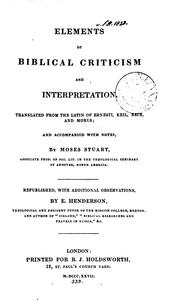Buy this book

Stuart, Moses. 1827. Elements of Biblical Criticism and Interpretation. London: Holdsworth. http://www.archive.org/stream/elementsbiblica00stuagoog#page
Moses Stuart, an American theologian of note in the early 19th century, assembled and edited several pieces from important theologians. This book, Elements of Biblical Criticism and Interpretation, is a republication by Ebenezer Henderson who has also added some notes to the works.
Moses Stuart said he made his interpretation from Johann August Ernesti, a prominant German theologian of the 18th century, "from the want of a text-book, in our country, on the science of interpretation." It was the fashion in Stuart and Ernesti's days to turn various arts into sciences by the application of critical methods and scientific rigor, as far as they could. Biblical interpretation was essentially a scholastic activity in dogmatics. The Church had hold on the subject and interpretation was legalistically made by traditions. In trying to more accurately interpret the biblical texts, the world was discovering greater meaning. Unfortunately, the movement extended to view the Bible as simply another book and the philosophical trends of the times were permitted to reshape the message to contemporary audiences. This essentially swung the pendulum to the other extreme. Some where in the middle of that swing, however, scholars and ministry students were treated to some substantial improvements to the art, and science, of interpreting Scripture. Stuart presented a very usable text toward that end.
Henderson's republication attempted to make clear that a reader of this work could indeed keep God in the works and critically interpret Scripture without resorting to humanistic philosophies. From what I read of Henderson's contributions to this text, he seemed to make it quite definite that divine inspiration still had its place in biblical interpretation, particularly in the sets of rules and guidelines Ernesti and such had laid down.
(Special note on notes: Ernesti made frequent use of Morus' Hermeneutics, a book that is sometimes hard to find, so if Ernesti is interesting and Morus is available, borrow both)
Buy this book

Subjects
interpretation, bible, biblical, critical, criticism, hermeneutics, scripture, meaning, translation, exegesis, contradictions, trope, passage, grammar, emphasis, usus loquendi, parallelism, analogy, comparison, Greek, Hebrew, etymology, catena patrum, scholia| Edition | Availability |
|---|---|
| 1 |
aaaa
|
Book Details
Table of Contents
Edition Notes
ID Numbers
Community Reviews (0)
Feedback?| August 11, 2020 | Edited by MARC Bot | remove fake subjects |
| June 28, 2011 | Edited by L Swinford | interpreting/interpret |
| June 28, 2011 | Edited by L Swinford | Edited without comment. |
| May 6, 2010 | Edited by EdwardBot | add Accessible book tag |
| December 11, 2009 | Created by WorkBot | add works page |









